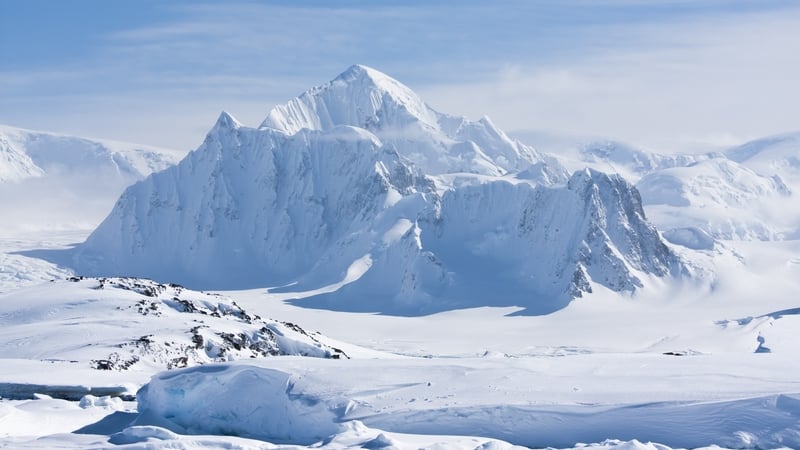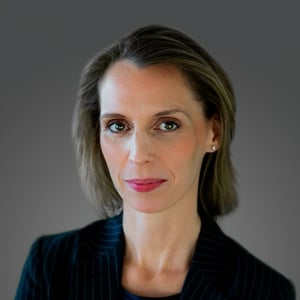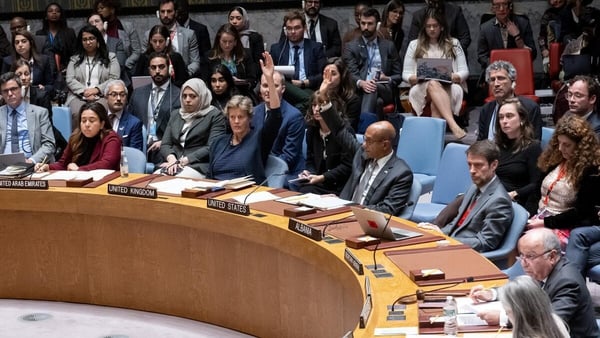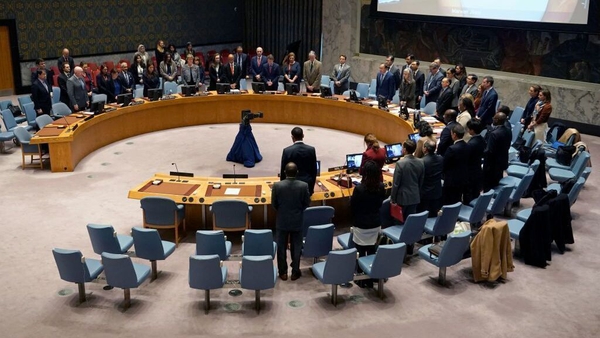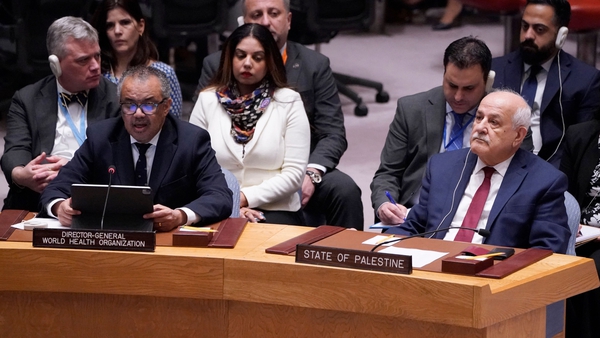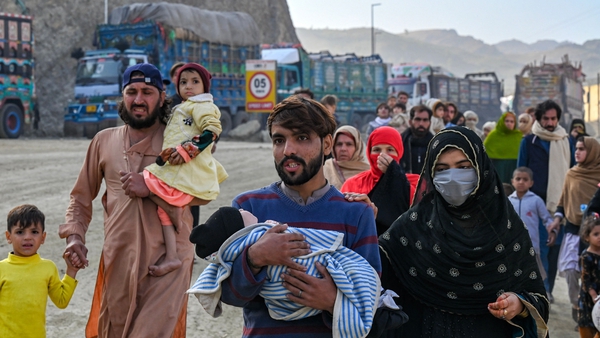Antarctica is a "sleeping giant being awoken by climate chaos", the UN Secretary-General has said.
António Guterres told reporters following a visit to the continent that he found it "profoundly shocking" to stand on the ice of Antarctica and hear directly from scientists how fast the ice is disappearing.
He said together Antarctica and Greenland were now melting three times faster than they were in the 1990s.
"That matters for us all. What happens in Antarctica doesn't stay in Antarctica," Mr Guterres said.
He said: "We live in an interconnected world. Melting sea ice means rising seas and that directly endangers lives and livelihoods in coastal communities across the globe.
"Floods and saltwater intrusion imperil crops and drinking water - threatening food and water security."
Mr Guterres said that without changing course the world was heading towards a "calamitous 3C temperature rise by the end of the century".
"We are trapped in a deadly cycle. Ice reflects the sun’s rays," Mr Guterres told reporters.
"As it vanishes, more heat is absorbed into the Earth’s atmosphere. That means more heating, which means more storms, floods, fires and droughts across the globe," he said.
He said that the cycle must be broken at COP 28, the UN climate conference, which begins in Dubai this week.
UAE says ready for rising heat risk ahead of COP28
Meanwhile, the United Arab Emirates is ready for soaring temperatures that are feared to make parts of the Gulf uninhabitable by the end of the century, the oil power's climate change minister has said.
Long experience of the harsh desert summers has taught the country to live with temperatures that regularly flirt with 50C, she said.
"We've actually been on the journey of adaptation for many years now," Mariam Almheiri, the UAE's minister of climate change and environment, said in an AFP interview ahead of the COP28 United Nations climate talks in Dubai.
"When you look at the temperatures now currently in the summer, there are people from around the world that say: 'How do you live in that temperature?'
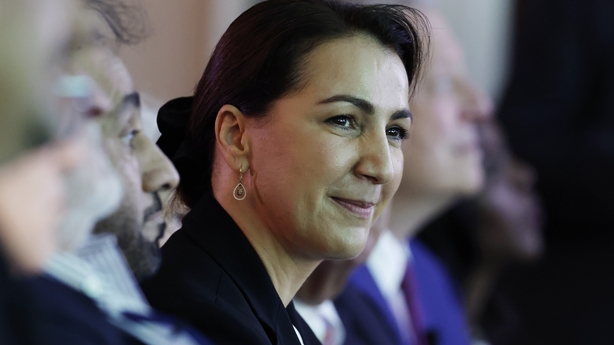
"But actually we can stay here during the summer and we live fine. We're able to do the activities we want to do. It's just we have already adapted since many, many years."
The UAE's scorching summers, when many flee for cooler climes and the streets empty, look set to worsen due to climate change, various studies show.
The Gulf region's extreme heat and high humidity are a dangerous mix as in such conditions the human body struggles to cool itself by evaporating sweat on the skin.
The combination is measured by a thermometer wrapped in a wet cloth to calculate the "wet bulb temperature" - the lowest possible through evaporative cooling.
The Gulf is one of the few places to have repeatedly measured wet bulb temperatures above 35C, the threshold of human survivability beyond which heat stress can be fatal within hours, regardless of age, health and fitness.
It is for this reason that experts warn accelerated climate change will make parts of the Gulf region unlivable by the end of this century.
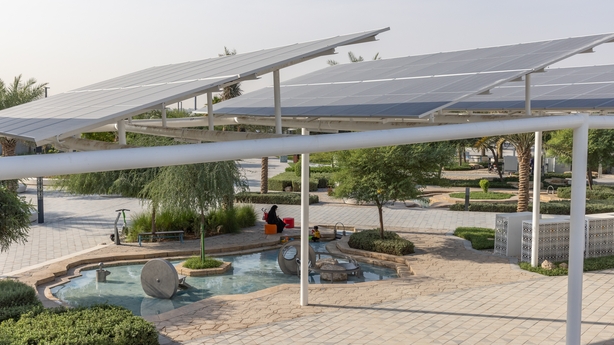
As global temperatures tick higher, with this year on course to be the hottest on record, the UAE is changing its building designs and urban planning to create cooler living environments, even outdoors, Ms Almheiri said.
More parks and vegetation, including a plan to plant 100 million mangroves - an effective carbon sink - by 2030, will also mitigate the heat, she added.
"People don't realise that actually, already more than 70% of our economy is non oil-based. We have actually already set up a lot of renewable energy infrastructure," she said.
"We've also made sure that buildings are set or start to be built at a certain level to take care of any sea-level rise that the models are looking like it might come up soon."
The high temperatures mean air-conditioning is used nearly year-round in the UAE's homes, offices, malls, cars and even bus stops, a key factor in making its carbon footprint one of the world's biggest per capita.
Other contributors are the fleets of SUVs, muscle cars and sports vehicles that clog the multi-lane highways, scant mass transport, and energy-heavy attractions such as an indoor ski slope with artificial snow that is kept at a steady minus -2C.
Despite these challenges, the UAE is targeting domestic carbon neutrality by 2050 - not including exported oil and gas - by ramping up nuclear, solar and wind energy, extending metro and rail services, and promoting electric vehicles.
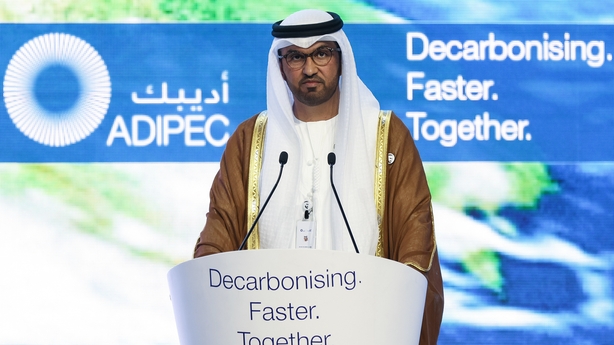
The UAE's Masdar - chaired by COP28 president and state oil giant CEO Sultan Al Jaber - is one of the world's biggest renewable energy companies, signalling the country's ambitions to lead the energy transition.
Changing blasé attitudes to energy and resources, in a multicultural, multi-lingual, often transient environment that is 90% expatriate, is one of the key tasks for the UAE, Ms Almheiri said.
"We look at it sector by sector, bringing in the private sector, bringing in community members, academia, and really making sure that youth are also part of this conversation, to understand how we can decarbonise these sectors, but how also individuals can do their part as well," the minister said.
"I myself always talk about stories that I do at home, whether it's trying to make sure you don't put any edible food in the bin, being a little bit more conscious about what you're buying, where is it sourced from," she added.
"The net zero strategy that we have just announced... it's a pathway that's pro-climate, pro-growth, but it also means that there needs to be mindset change in the way we do business and the way we live," Ms Almheiri said.
Reports UAE to use COP28 for oil and gas deals 'very worrying'
Meanwhile, former president of Ireland and chair of the Elders Mary Robinson has described reports that the UAE has been planning to use its role as host of this year's UN climate talks as an opportunity to strike oil and gas deals with other countries as "very worrying".
Mrs Robinson said that if the President of COP28 in Dubai used his office to negotiate private deals, it is not correct and not appropriate.
The BBC said it has seen papers showing plans for COP28 President Dr Sultan al-Jaber to discuss fossil fuel deals with foreign governments ahead of Thursday's COP28 summit.
According to leaked briefing documents, the UAE has plans to discuss fossil fuel deals with 15 countries.
The UAE team did not deny using COP28 meetings for business talks, and said: "Private meetings are private".
The documents, obtained by independent journalists at the Centre for Climate Reporting working alongside the BBC, were prepared by the UAE's COP28 team for meetings with at least 27 foreign governments ahead of the COP28 summit, which starts on 30 November.
They cover proposed talking points, including one for China which says ADNOC, the UAE's state oil company, is "willing to jointly evaluate international LNG (liquefied natural gas) opportunities" in Mozambique, Canada and Australia.
Mrs Robinson said the there was already a perception that the presidency of COP was "a bit compromised", and this may make the situation even more difficult.
She said it is not right that a president of the COP would use the presidency of the office to negotiate private deals.
"If that has happened, that's not correct and not appropriate, as I don't think that has happened before.
"We have no time not to make the best use of COP," Mrs Robinson said.
The former president and now Chair of the Elders, an independent group of global leaders working for peace, justice, human rights and a sustainable planet, will be attending the climate talks in Dubai.
The UAE is among the world's top-ten oil-producing countries and with an oil executive heading up the summit, COP28's reputation has previously come into question.
Climatologist & Emeritus Professor Maynooth University John Sweeney said there is a "real issue of conflict of interests here and I think that has been confirmed to some extent by the revelations that we've been hearing from the BBC".
However, he thinks that recent developments may end up having a positive impact on the climate talks.
"It may well be that there is so much pressure on the presidency now going onto COP, that perhaps we may see something more positive than our worst fears that we have at the moment being realised," Mr Sweeney added.
Additional reporting Aengus Cox
